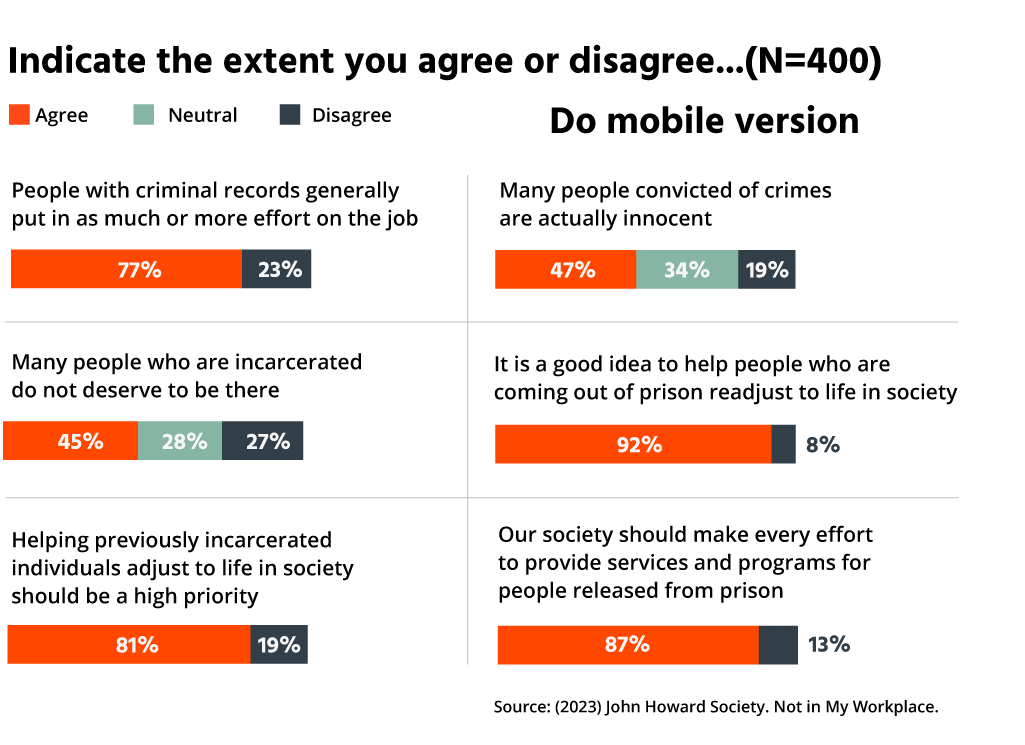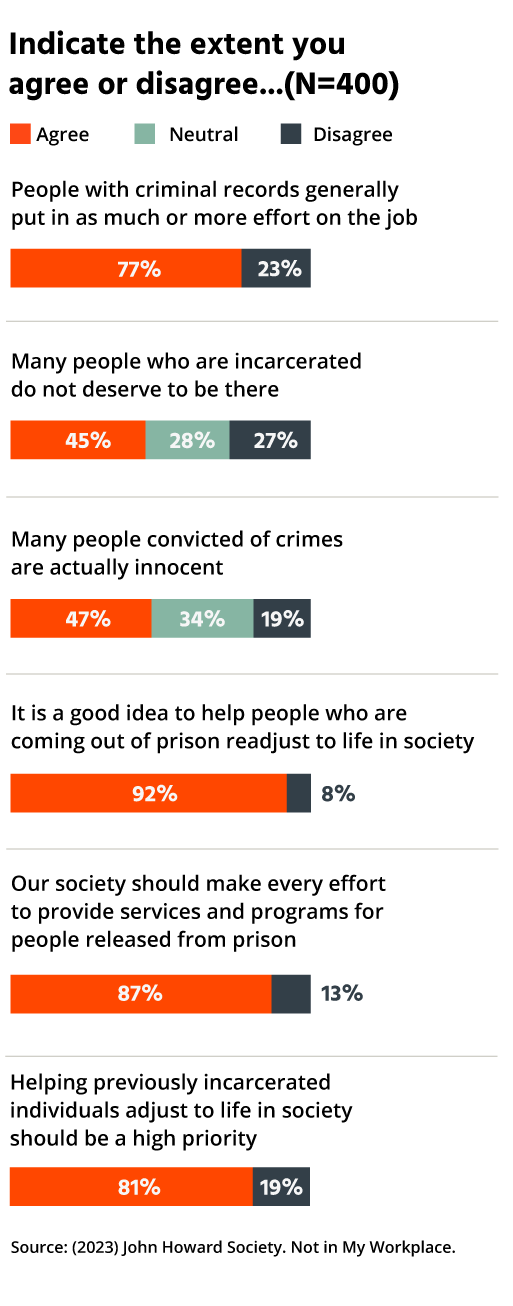
-
Services
All ServicesIdentityPre-HirePost-HireSolutionsTechnology
-
Industries
- Integrations
-
Resources
-
About Us
March 28th, 2024 | Sterling

Fair chance hiring is a legislative model requiring employers to give candidates an equal opportunity at employment. Employers who practice fair chance hiring might, for example, hire someone with a driving-related conviction for an office job or someone with a theft-related conviction to work as a driver. The goal is to give all qualified candidates a fair assessment, even when they have a criminal record, offering a lifeline to people who have been previously incarcerated, who often struggle to find work due to widespread prejudices. Fair chance hiring also provides a boon to employers who are struggling to fill skilled positions by helping them ensure they don’t lose out on great candidates due to old or irrelevant offences, and works best in tandem with a robust background screening program.
In some provinces and territories, including Quebec, British Columbia, Prince Edward Island, Yukon, Newfoundland, and Labrador, fair hiring practices are enshrined by law, allowing employers to take the criminal record into account if, and only if, it is directly related to the job.
In contrast, other provinces offer candidates fewer protections. In Ontario, for instance, employers are only restricted from discriminating based on a criminal record if the offender received a pardon or a criminal record suspension. Despite recent research showing the benefits of fair chance hiring for both candidates and employers, many organizations remain hesitant to hire applicants with a record.
The John Howard Society of Ontario, a nonprofit organization dedicated to effective, just, and humane responses to crime, has recently published a report, Not in My Workplace. Within, they present their discoveries along with suggestions to ensure equal opportunities for all employees. Let’s go over their findings and recommendations for implementing fair hiring policies.
According to the Government of Canada, approximately 3.8 million Canadians have a criminal record. It is estimated that between 50% to 75% of formerly incarcerated people struggle to find employment after their release. This reality disproportionately impacts populations who are overrepresented in prisons, including Black and Indigenous individuals, further widening the economic gap between already-disenfranchised people and the rest of the population. Research shows that employment reduces rates of recidivism, which benefits both former offenders and society as a whole. In another study conducted by the SHRM Foundation and Charles Koch Institute, employers stated that individuals with criminal records performed their jobs as well or better than workers without a record. Unfortunately, despite these findings, employers remain reluctant to hire candidates with criminal records.
During 2020-2022, the John Howard Society of Ontario partnered with a research team to survey 400 Canadian hiring managers. Respondents were asked various questions relating to the use of criminal record screening and related policies in an employment context. The findings from this research are compiled in the Not in My Workplace report.
What the survey found is that although they may endorse fair chance hiring in principle, many employers hesitate to implement it in practice. Overall, 92% of the respondents indicated that it was important for them to help recently incarcerated individuals become part of society again. However, 55% of hiring managers surveyed stated that candidates with a record “pose a greater risk or liability and have lower credentials compared to those without a record.” In addition, 51% of respondents said they would not hire someone if a criminal record was uncovered during the pre-hire screening process. Further, nearly half of the respondents (45%) expressed uncertainty about their company’s hiring policy, uncovering a gap that employers should address to move forward.


Among employers who confirmed they were willing to hire applicants with a criminal record, factors such as the age, seriousness and relevance of the offence were mentioned. This highlights the need to design a background screening policy that sets out specific criteria for identifying genuine risks without screening out qualified candidates.
Given that many employers are hesitant to hire applicants with a criminal record due to these and other misconceptions, the John Howard Society recommends employers educate staff about the benefits of fair chance hiring to address this issue. Hiring managers should be informed of the increasing amount of research showing no correlation between criminal history and poor performance at work, alongside the broader societal benefits of reintegration.
Fair chance hiring does not mean that employers should lower their standards or get rid of them entirely. A compliant and thorough background screening policy remains essential to create a workplace culture of trust and safety. When evaluating the results of the criminal record, employers should ask themselves questions such as:
How can employers help create a more inclusive workplace? They can offer candidates clear insight into the process and a good understanding of the impact their offences could have on their employment. When candidates know that their criminal history will not necessarily be held against them, they often feel more comfortable to accurately disclose their criminal record. Clear and transparent adjudication guidelines can also simplify the decision-making process for hiring managers.
As part of their suggestions for implementing fair hiring, the John Howard Society recommends employers draft clear and transparent policies regarding the use of pre-employment criminal record screening. Background screening policies should be refined to outline the specific type of criminal record check required for each position, defaulting to the least intrusive option. For instance, there is generally no need to complete a Vulnerable Sector Check for employees who will not be working with children or other vulnerable persons. Hiring managers should also receive guidance on assessing “Not Clear” results, considering factors such as the age, severity and relevance of the offences. A trusted background screening provider can help employers draft an appropriate and compliant policy.
Employers who are ready to integrate the principles of fair chance hiring in their employment policies can demonstrate their engagement by taking the Fair Chance Pledge.
A trusted background screening partner like Sterling Backcheck can provide support to employers who want to implement a fair hiring policy. One of the issues identified by the John Howard Society is the high number of employers who default to using the most intrusive criminal record screening search available, the Vulnerable Sector Check, even when it may not be appropriate or relevant for the position.
While the Vulnerable Sector Check is only offered through local police services, less intrusive options, such as the Enhanced Police Information Check, can be requested through third-party providers. The Enhanced Police Information Check targets both adult criminal convictions that have not been pardoned and active judicial matters, providing employers with a thorough criminal screening that leaves out pardoned convictions and lets rehabilitated offenders get a fresh start. In addition, some providers may offer “knockout lists.” These lists of irrelevant offences, such as driving-related offences for non-driving positions, are excluded from the final background screening report.
Adopting a privacy-conscious approach to handling candidate data is another way in which background screening providers can help employers give their candidates a fair assessment. Secure online candidate and client experiences ensure that only authorized individuals can access the background screening reports.
Finally, by playing an active role in the hiring industry, background screening providers can advocate for employers’ and candidates’ interests. Sterling Backcheck has formed a partnership with the John Howard Society in order to strengthen our engagement towards fair chance hiring and promote the fair assessment of all candidates, including those with criminal records, while continuing to champion a workplace culture of trust and safety.
Learn more about the ways Sterling Backcheck can help you set up a compliant and privacy-conscious background screening program by contacting our experts.
This content is offered for informational purposes only. First Advantage is not a law firm, and this content does not, and is not intended to, constitute legal advice. Information in this may not constitute the most up-to-date legal or other information.
Readers of this content should contact their attorney or lawyer to obtain advice concerning any particular legal matter. No reader, or user of this content, should act or refrain from acting on the basis of information in this content without first seeking legal advice from counsel or lawyers in the relevant jurisdiction. Only your individual attorney or legal advisor can provide assurances that the information contained herein – and your interpretation of it – is applicable or appropriate to your particular situation. Use of, and access to, this content does not create an attorney-client relationship between the reader, or user of this presentation and First Advantage.